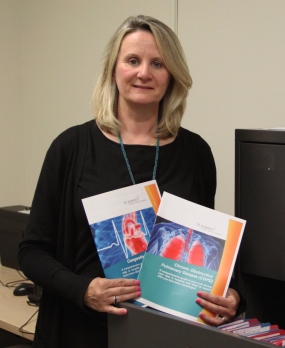Navigating your way through the health care system can be challenging, especially if you have a chronic illness like Chronic Obstructive Pulmonary Disease (COPD) or Congestive Heart Failure (CHF).
Thanks to St. Joe’s Patient Navigator and Registered Nurse, Janice Klutt, patients experience a smooth transition from their hospital care and back into the community. Klutt supports patients with COPD and CHF to manage their illness, through education and assessment while they are in hospital and coordinating follow up care when they are discharged back home.
The Patient Navigator role has been in place for two years and stems from St. Joe’s work to reduce re-admission rates for patients with COPD and CHF. “Living with any chronic disease is difficult because of the drastic lifestyle changes that patients need to make,” explains Klutt. “The changes are needed to stay healthy, but it’s hard. Not being able to maintain these changes is often the reason COPD and CHF patients are re-admitted back to hospital,” Klutt adds.
Klutt’s first connection with patients is right at the bedside when they are admitted to St. Joe’s. Many patients she sees are elderly and have additional health issues on top of their chronic illness. The socio-economic status of her patients is another huge factor that affects their overall health. For these reasons, Klutt works closely with them so they are educated about their condition and know what to do if they start feeling unwell and what other resources they can access.
“I explain to them what their condition is, what to watch out for and what to do to prevent the exacerbation of either condition,” says Klutt. Both COPD and CHF are chronic illnesses that need to be managed closely once a person is diagnosed, because there is no cure. COPD is a long-term disease caused most often by smoking, and includes chronic bronchitis and emphysema. The damage caused by COPD makes the movement of air in and out of the lungs difficult. CHF is a common condition that develops once the heart is damaged by diseases like heart attacks or other medical illnesses.
When patients are ready to go home, Klutt arms them with an educational package including pamphlets that explain their condition in simple, easy-to-understand language. They also get a “stop light” visual, in the form of a fridge magnet, outlining what warning signs should prompt a call to Klutt for advice, a visit to the family doctor or an immediate trip to the Emergency Department (ED).
A crucial step Klutt oversees for patients before they leave the hospital is booking a follow up appointment with their family doctor for a week after discharge. By the time the patient shows up for their appointment, their doctor has a full summary of their recent hospital stay, thanks to the information she sends them. Klutt also guides patients in making the necessary changes to their lifestyle to improve their health and monitors how well they respond to these changes.
The biggest piece of advice given to her COPD patients is to quit smoking. “I connect them with our smoking cessation program here at St. Joe’s or at the Centre for Addiction and Mental Health,” says Klutt. “Many of the patients I see are lower-income individuals and can’t afford medication so I try to find programs that they are able to manage.”
MORE: SOUTHLAKE IMPLANTS WORLD’S SMALLEST HEART MONITOR
“For CHF patients, they need to restrict fluid and salt intake – and it really opens up their eyes to the types of food they are eating, especially pre-packaged food. But for many, that’s all they can afford because they don’t have the resources to buy fresh food and cook from scratch,” says Klutt. Community agencies like Meals on Wheels are a great resource to access healthier foods, at least for the first few weeks when patients are home from the hospital and re-gaining their strength, she adds.
Klutt also makes referrals to the Toronto Central Community Care Access Centre’s (CCAC) Rapid Response Team for patients that are high-risk for re-admission. Risk factors include a long stay in hospital, how many times the patient has been to the ED in the last six months and any other co-morbidities they may have. The team is deployed to the patient’s home within 24 hours of their discharge, where they do a full “head to toe” assessment of the patient, review their medications with them, and alert Klutt to any concerns that come up during the home visit. The team checks in with patients via phone calls or ongoing visits when needed, over a 30-day period.
The Rapid Response Team was designed on the model Klutt used when her role first launched. This collaborative relationship with St. Joe’s and the CCAC means that high risk patients have support at home, also allowing her to spend more time with patients in hospital.
MORE: TWO HEADS BETTER THAN ONE WHEN IT COMES TO EHEALTH
Ultimately, education, follow up care and ensuring patients are connected with their family doctors and other community resources are ways Klutt is helping them manage their conditions at home to avoid being re-admitted to hospital. When patients have the right tools and support they need, their quality of life can improve so they can live well even with a chronic illness.
Klutt feels a sense of pride in building strong relationships with her patients and being an important part of their care to support them in the hospital and once they are at home.
“I help to ensure wrap around care for patients, so they don’t fall through the cracks. The key is educating them so they understand their condition and linking them to their family doctor and CCAC. I facilitate to those connections and build those partnerships so that our patients can get the best care when they need it – whether they are here at St. Joe’s or in the community.”


